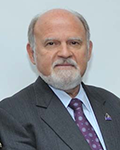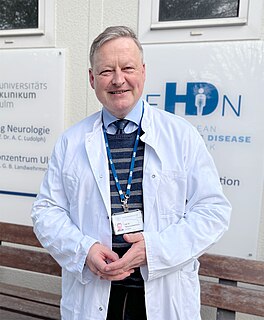
A genetic disorder is a health problem caused by one or more abnormalities in the genome. It can be caused by a mutation in a single gene (monogenic) or multiple genes (polygenic) or by a chromosomal abnormality. Although polygenic disorders are the most common, the term is mostly used when discussing disorders with a single genetic cause, either in a gene or chromosome. The mutation responsible can occur spontaneously before embryonic development, or it can be inherited from two parents who are carriers of a faulty gene or from a parent with the disorder. When the genetic disorder is inherited from one or both parents, it is also classified as a hereditary disease. Some disorders are caused by a mutation on the X chromosome and have X-linked inheritance. Very few disorders are inherited on the Y chromosome or mitochondrial DNA.

Huntington's disease (HD), also known as Huntington's chorea, is a neurodegenerative disease that is mostly inherited. The earliest symptoms are often subtle problems with mood or mental abilities. A general lack of coordination and an unsteady gait often follow. It is also a basal ganglia disease causing a hyperkinetic movement disorder known as chorea. As the disease advances, uncoordinated, involuntary body movements of chorea become more apparent. Physical abilities gradually worsen until coordinated movement becomes difficult and the person is unable to talk. Mental abilities generally decline into dementia. The specific symptoms vary somewhat between people. Symptoms usually begin between 30 and 50 years of age but can start at any age. The disease may develop earlier in each successive generation. About eight percent of cases start before the age of 20 years, and are known as juvenile HD, which typically present with the slow movement symptoms of Parkinson's disease rather than those of chorea.
The Michael J. Fox Foundation for Parkinson's Research is dedicated to finding a cure for Parkinson's disease (PD) through funded research and ensuring the development of improved therapies for those living with Parkinson's today. The organization hosts the Fox Trial Finder, which is a website for presenting clinical trials in Parkinson's disease clinical research.
Marjorie Greenblatt Guthrie, who used Marjorie Mazia as her professional name, was a dancer, dance teacher, and health science activist. She was married to folk musician Woody Guthrie. Her children with him include folk musician Arlo Guthrie and Woody Guthrie Publications president Nora Guthrie.
The Crohn's & Colitis Foundation (CCF) is a volunteer-driven non-profit organization dedicated to finding cures for Crohn's disease and ulcerative colitis and improving the quality of life of children and adults affected by these digestive diseases. Founded by Shelby Modell and Irwin M. Rosenthal, and formerly known as National Foundation for Ileitis and Colitis and Crohn's and Colitis Foundation of America, it was incorporated on December 17, 1965. CCF has more than 50,000 members, served by the national headquarters, as well as over 40 chapters nationwide.
Lupus Canada is a national voluntary organization dedicated to improving the lives of people living with systemic lupus erythematosus (SLE) through advocacy, education, public awareness, support and research. Formed in 1987, Lupus Canada is a federally registered non-profit charity and its national office is located in Markham, Ontario.
Huntington's disease has been shown in numerous formats, more so as awareness of the condition has increased. Here is a list of references to it in popular culture;

The Huntington's disease Outreach Project for Education at Stanford (HOPES) is a student-run project at Stanford University dedicated to making scientific information about Huntington's disease (HD) more readily accessible to patients and the public. Initiated by Professor William H. Durham in 2000, HOPES is a team of faculty members and undergraduate students at Stanford that surveys the rapidly growing scientific and clinical literature on Huntington's disease. They then present this information in a web resource that reflects the current scientific understanding of HD.

Nancy Wexler FRCP is an American geneticist and the Higgins Professor of Neuropsychology in the Departments of Neurology and Psychiatry of the Columbia University College of Physicians and Surgeons, best known for her involvement in the discovery of the location of the gene that causes Huntington's disease. She earned a Ph.D. in clinical psychology but instead chose to work in the field of genetics.

Michael R. Hayden, is a Killam Professor of Medical Genetics at the University of British Columbia, the highest honour UBC can confer on any faculty member. Only 4 such awards have ever been conferred in the Faculty of Medicine. Dr. Hayden is also Canada Research Chair in Human Genetics and Molecular Medicine. Hayden is best known for his research in Huntington disease (HD).

Jeffrey Bryan Carroll is a scientific researcher in the field of Huntington's disease (HD). As a carrier of the abnormal gene that causes HD, he is also a public advocate for families affected by the disease, and co-founder of the HD research news platform HDBuzz. His life and work were the subject of a 2011 Gemini award-nominated CBC documentary feature. Carroll is an Associate Professor of neuroscience in the Department of Psychology at Western Washington University.
The Huntington's Disease Association (HDA) is a charity that supports people in England and Wales affected by the genetic neurodegenerative brain condition Huntington's disease (HD).
The Huntington Society of Canada (HSC) is a non-profit organisation that supports people in Canada affected by the genetic neurodegenerative brain condition Huntington disease (HD).

Do You Really Want To Know? is a 2012 documentary film directed by John Zaritsky and produced by Kevin Eastwood. Using interviews and dramatic recreations, the film recounts the stories of three families who carry the gene for Huntington's disease, a neurodegenerative illness which is the result of a genetic abnormality, whose symptoms typically appear in mid-life. Members of each featured family have undergone predictive testing to learn whether or not they have inherited the gene that causes the disease, and they each describe the impact that testing has had upon their lives. "Do You Really Want To Know?" had its world premiere in Canada at the 2012 DOXA Documentary Film Festival and its broadcast premiere on November 13, 2012 on Knowledge Network.
The Self-Help Group for Cerebral Palsy (SGCP) is a non-governmental and non-profit organization in Nepal dedicated for helping and educating children and adults with cerebral palsy. Cerebral palsy (CP) is a neurological disorder that is caused during childhood which permanently affects body movement and muscle coordination. The organization has one rehabilitation center established in 2005, situated in Dhapakel, Lalitpur that consists of a team of medical professionals, trained teachers and social workers.

Shalva is a non-profit organization that supports and empowers individuals with disabilities and their families in Israel. The organization works with a wide range of individuals with disabilities: mental retardation, developmental delays, learning disabilities, attention deficit disorders, the Autism spectrum, special needs with recognized handicaps, and more.

John W. Walsh was an American non-profit leader and patient advocate. After being diagnosed with alpha-1 antitrypsin deficiency, he co-founded the Alpha-1 Foundation and AlphaNet, both of which serve people diagnosed with that condition, and the COPD Foundation, which serves people with chronic obstructive pulmonary disease. As an advocate for alpha-1 and COPD patients, Walsh lobbied before Congress for increased research funding and medical benefits for patients, and served on a number of health-related committees and organizations.
Beverly L. Davidson is an American geneticist. She is the director of the Raymond G. Perelman Center for Cellular and Molecular Therapeutics at Children's Hospital of Philadelphia. In this role, she investigates gene therapy for neurodegenerative diseases, specifically Huntington's.

Georg Bernhard Landwehrmeyer FRCP is a German neurologist and neuroscientist in the field of neurodegeneration primarily focusing on Huntington's disease. Landwehrmeyer is a professor of neurology at Ulm University Hospital. He was one of the founders of the European Huntington's Disease Network (EHDN) in 2004 and was chairman of its executive committee until 2014.










